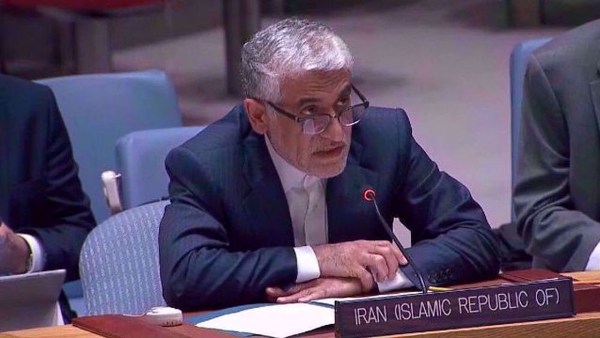
Iranís Ambassador to the United Nations (UN) Majid Takht-Ravanchi (photo by IRNA)
Iranís ambassador to the United Nations (UN) has highlighted the Islamic Republicís stance that resistance against foreign occupation constitutes self-defense, insisting on the right of Palestinians to resist the occupation of their land by the Israeli regime.
"Our longstanding legal position is that any resistance against occupation and foreign intervention in the exercise of self-defense cannot be considered terrorism," said Ambassador Majid Takht-Ravanchi on Tuesday, while addressing the UN General Assemblyís session on Terrorism and Global Counter Terrorism Strategy.
"In this context, the Palestinian people have every right to resist the occupation of their territory by the Zionist regime," he added.
He paid "special tribute to the victims of terrorism, particularly Major General Qassem Soleimani, a prominent figure in the fight against Daesh in Iraq and Syria," reiterating that "he was assassinated in a terrorist attack perpetrated by US forces" at Baghdad International Airport in January 2020.
It is also our strong belief that under the pretext of fighting terrorism, no State has the right to commit acts of aggression, interference in the internal affairs of other States, or condone flagrant violations of human rights and humanitarian law, such as torture, kidnapping, illegal detention, disappearance, or extrajudicial execution and targeted killing," he said, in apparent reference to the atrocities committed by US military forces and CIA operatives around the globe in recent years, particularly in Muslim nations such as Iraq, Afghanistan, and Pakistan.
The senior Iranian diplomat went on to express concerns about the "presence of Foreign Terrorist Fighters (FTFs) and their accompanying families in the conflict zones" across the entire region, further pointing to the international communityís failure to address other FTF-linked issues such as repatriation.
"While there are unanswered questions as to how and why those FTFs, including from countries that claim to pioneer human rights, have been radicalized and deployed, committing acts of terrorism in our region, it is also a matter of serious concern that the same countries refrain from repatriating those FTFs and their families especially women and children from camps in conflict zones," he noted.
"Since 1979, more than 17,000 of our innocent citizens, including the president, the prime minister, the head of judiciary, several ministers and members of parliament as well as several nuclear scientists, have been assassinated by terrorist groups that are being sheltered and provided safe havens in Europe and North America with unimpeded access to and connections with government officials," the Iranian UN envoy reiterated.
Takht-Ravanchi told the UN body that "the strategy ‘calls upon member states to deny terrorist groups safe haven, freedom of operations, movement and recruitment and financial, material or political supportí and ‘to ensure that terrorists do not find safe haven online.í"
"In the same vein, the Islamic Republic of Iran strongly supports access to justice for victims of terrorism and victims of measures taken under the pretext of fight against terrorism, including through drone attacks," he added.
"As the Strategy recalls, any national efforts to compensate the victims of terrorism should fully respect international law, including the principle of immunity of states and their properties."
He slammed dual standards and illegal unilateral measures in the name of counter-terrorism.
"Unilateral listing of UN member States or their constitutionally-established institutions accusing them of supporting terrorism, in order to pursue a political agenda, contradict purposes and principles of the UN Charter and as such must be rejected," he said. "Unilateral coercive measures (UCMs) continue to undermine the efforts of targeted countries in countering terrorism."
"Furthermore, since by nature, UCMs target ordinary people, they contribute to the root causes of terrorism," he added. "In addition, UCMs are generally imposed to incite insurgency and dissatisfaction among ordinary citizens against their government and as such are no less than acts of terrorism."
During his remarks, Takht-Ravanchi also pointed to Iranís "unwavering commitment" to countering global terror, saying, "While emphasizing national ownership and leadership in combating terrorism, and recognizing the pivotal role of the General Assembly in this process, the Islamic Republic reiterates its unwavering commitment to combat terrorism and rejects all acts and methods of terrorism."
"Still, in most parts of the world, socioeconomic and political problems, illegitimate military presence and foreign military intervention and occupation, constitute the main sources of terrorism and violent extremism," he said.
LINK: https://www.ansarpress.com/english/23184
TAGS:






























 Iran rejects Reuters report on deal in Vienna talks as effort to boost Western sideís standing
Iran rejects Reuters report on deal in Vienna talks as effort to boost Western sideís standing 




